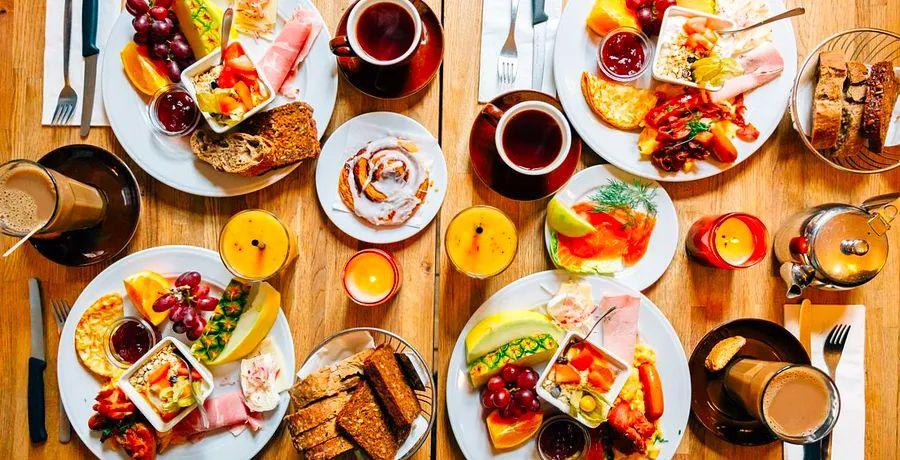Farewell to the Breakfast Buffet


There’s something uniquely satisfying about the travel routine of waking up in fresh hotel linens, wandering downstairs, and discovering a lavish breakfast buffet laid out just for you.
Then comes the delightful stroll to check out the spread: from chafing dishes filled with scrambled eggs and pancakes to, depending on your location, offerings like soup, porridge, sushi, artisanal cheeses, flatbread, noodles, and, of course, an endless supply of miniature Kellogg’s cereal boxes. Use the tongs to load your plate with a scone, a slice of cantaloupe, and a piece of mortadella; fill a bowl with a hearty grain dish topped with sweet, salty, or even fishy delights. Your travel day is just beginning, and here’s a feast already prepared for you.
However, the breakfast buffet is undoubtedly a relic of the past. In the early days of COVID-19, major hotel chains like MGM Resorts, Hilton, Marriott, Four Seasons, and InterContinental halted food service entirely, including breakfast. Now, as the hospitality industry seeks lasting, COVID-conscious solutions, buffets are the first to go.
While a generous platter of muffins or an elegantly arranged selection of cold cuts may be tempting, communal food displays are also prime environments for spreading viruses. A team of scientists in Japan recently tested a buffet under ultraviolet light, revealing just how easily a virus can be transmitted via tongs, drink pitchers, food tray lids, silverware, and glasses—essentially, everything.
Even if hotels were to reinstate breakfast buffets, would today’s guests—armed with a new awareness of hygiene—still want them?
John Nicholls, a pathology professor at the University of Hong Kong, suggests that the issue lies less with the buffet itself and more with our inadequate handwashing, which can spread viruses on contact surfaces. “Buffets are a place where crowds gather, sharing utensils and risking the transmission of germs,” Nicholls explains. “Hotels have favored buffets for economic reasons, but it’s understandable to think their time may be up.”
Claudio Scarpa, director of the hotel association for Venice, Italy, agrees: “The breakfast buffet will soon be a thing of the past.” His group has created a detailed document outlining new regulations for local hotels, covering everything from disinfection practices to social distancing measures. Instead of an elaborate buffet, “guests will now receive a breakfast bag,” Scarpa states.
The American Hotel & Lodging Association has also adopted its own new regulations under the industry-wide Safe Stay initiative, enhancing health and safety measures for reopening. Dr. Richard Ghiselli, head of the School of Hospitality & Tourism Management at Purdue University, is a member of the newly established Global Cleanliness Council with Marriott Hotels.
“Restaurant operators are advised to eliminate self-serve buffets and salad bars,” Ghiselli says, noting that buffets might survive in a modified format with new guidelines. “Where allowed, sneeze guards must be installed, and staff should frequently change, wash, and sanitize utensils while placing barriers in open areas,” he explains. So much for waiting in line for hash browns or crowding near someone at the toaster. “Hotels must also use floor markings and signs to promote social distancing,” he adds.
The issue isn't limited to hotels; earlier this month, buffet chains Souplantation and Sweet Tomatoes announced the permanent closure of all 97 locations. However, the hotel industry faces a unique challenge; completely halting food service isn’t feasible when guests continue to arrive hungry. So, what’s the solution? Chains like Choice Hotels are opting for pre-packaged breakfasts. Omni Hotel’s Safe and Clean initiative provides pre-plated meals served with single-use cutlery, while Best Western’s We Care Clean plan features “Grab & Go” pre-plated options.
Luxury resorts, however, require a more sophisticated approach than these sack lunch alternatives. The Hotel Monte-Carlo Bay in Monaco has devised a high-touch solution. “We’ve revamped our renowned brunch to be served by waitstaff rather than a buffet,” says Frederic Darnet, the hotel’s general manager. This new method, dubbed “Table Brunch,” allows staff to deliver dishes directly to guests. For those looking to skip the restaurant, they offer a Floating Breakfast package—a lavish take on the traditional French breakfast served on a floating tray in the lagoon for around $140. “I’m glad we can adapt,” he adds.
The Four Seasons is also aiming to eliminate breakfast buffets in favor of various experiential concepts, including a sushi-inspired conveyor belt. “We’re exploring numerous ideas, focusing on individualization,” shares John Johnson, executive chef at the Four Seasons Hotel New York. “This includes unique miniature dishes rather than standard buffets and movable feasts in small, personal containers on a touchless conveyor belt.”
Naturally, there’s the classic socially distanced breakfast option: room service. Many hotels are enhancing their in-room menus, making them accessible online. Instead of a server rolling in a cart, many establishments are opting for contactless drop-offs and disposable materials. “We are collaborating with Think Package, a custom packaging company, to create boxes that unfold into placemats, feature personal notes from the chef, elastic slots for cutlery, and coasters for beverages,” explains Albert Rothman, vice president of food and beverage at EOS Hospitality, which operates 16 independent hotels along the east coast. “We prioritize eco-friendly packaging whenever possible.”
As we collectively grieve the disappearance of the breakfast buffet—the sneaky joy of snagging an extra muffin; the chaotic thrill of combining spaghetti, raw fish, pineapple, Edam cheese, and waffles on one plate—there’s still one travel staple that remains steadfast: the mini bar. Thankfully, those aren’t going anywhere.

1

2

3

4

5
Evaluation :
5/5